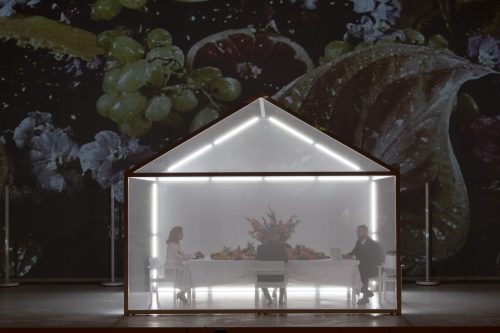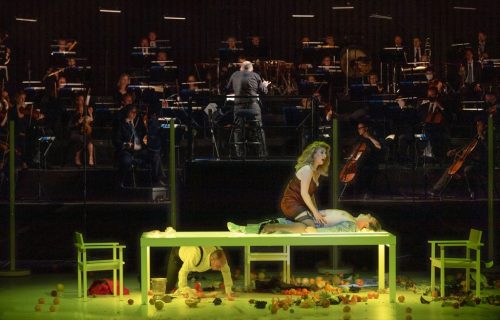 Netherlands Rudi Stephan, Die ersten Menschen (The First Humans): Soloists, Royal Concertgebouw Orchestra / François-Xavier Roth (conductor). Filmed (directed by Sarah Derendinger) at De Nationale Opera, Amsterdam, and streamed from 25.6.2021 on ARTE Concert. (JPr)
Netherlands Rudi Stephan, Die ersten Menschen (The First Humans): Soloists, Royal Concertgebouw Orchestra / François-Xavier Roth (conductor). Filmed (directed by Sarah Derendinger) at De Nationale Opera, Amsterdam, and streamed from 25.6.2021 on ARTE Concert. (JPr)

Production:
Director – Calixto Bieito
Set design – Rebecca Ringst
Costumes – Ingo Krügler
Lighting – Michael Bauer
Video – Sarah Derendinger
Cast:
Chawa – Annette Dasch
Adahm – Kyle Ketelsen
Kajin – Leigh Melrose
Chabel – John Osborn
Thanks to Holland Festival 2021 (another country clearly on the other side of the pandemic whilst the UK is mired in a self-inflicted out-of-control Delta variant) there is a rare (unique?) opportunity from the Dutch National Opera to see and hear Rudi Stephan’s opera Die ersten Menschen – that is subtitled an ‘Erotic Mystery’ – which has not been staged since the 1980s. Stephan (1887-1915) is a name entirely new to me – and many I suspect – as too few works of his have survived. He was born in Worms in Germany and I read that he was destined to be one of the greatest composers of his generation and his first compositions had even gained Stephan a contract with the famous publishing house Schott. However, he died tragically young and not long after completing Die ersten Menschen, his first and only opera.
Apparently, he was given a hard time by radical playwright and philosopher Otto Borngräber whose drama the opera was based on, but money from Stephan’s wealthy father seems to have sweetened the deal. This was perhaps mainly because Borngräber had been hoping Richard Strauss might have been interested, and although he wasn’t Strauss is never far away in the musical idiom of Stephan’s finished opera. Not that the original play had any great success as it was performed only once in Munich in 1912 before it was banned by the local censors for its explicit, and I suspect blasphemous, content.
Die ersten Menschen was to have been premiered in early 1915 however the First World War intervened. That year Stephan left for the front in Western Ukraine and during his send-off he is supposed to have said: ‘As long as nothing happens to my head, there is still so much beauty in it.’ Sadly, you can guess where he was hit by the Russian bullet that killed him barely two weeks later in September.
That is not the only tragedy which surrounds Stephan because most of his manuscripts and unfinished works were obliterated as a result of the bombing of Worms in 1945! Eventually, Die ersten Menschen was put on in 1920 in Frankfurt to much critical acclaim, but it never found much of audience, then or over subsequent decades.
This isn’t the story of Adam, Eve, Cain and Abel (thinly disguised as Adahm, Chawa, Kajin and Chabel) that you could expect from the bible, and it has been likened to late-nineteenth or early-twentieth century religious works such as Lew Wallace’s novel Ben-Hur: A Tale of the Christ, Gabriele d’Annunzio’s musical mystery play Le Martyre de Saint Sébastien, and – something it shares much in common with – Oscar Wilde’s tragedy Salome. Genesis meets the Oedipus myth in this post-Freudian tale of Adam and Eve after they have been expelled from the Garden of Eden and Die ersten Menschen in its own way tries to explain why Cain killed Abel.
Adahm and Chawa are now older, but he has become self-absorbed on acquiring more knowledge though science and director Calixto Bieito underlines this by showing him at a laptop! He seems to have ‘gone off’ Chawa who longs for the days of their youth. Kajin gives up on tending his crops and wants to roam the world in search of a ‘wild woman’. The younger Chabel is overcome throughout by spiritual ecstasy, reminding the family of God the Creator to whom he sacrifices a lamb (Bieito’s stuffed toy that Chabel seems inordinately fond of).
So far so good but this is only half the story because sex and desire makes up the rest. Adahm has gone out and – as the only woman around – Kajin lusts after Chawa and to her horror tries to seduce her. She still yearns to be physical with Adahm, but he is uninterested now in her whilst she implores God to make her husband want her again as he did when they were younger. It is then Chabel’s turn to realises how beautiful his mother is and – turning the tables – Chawa even attempts to seduce Chabel. This riles Kajin and he kills him and Chawa is stopped by Adahm from retaliating and furthering the bloodshed that he envisions will escalate in humankind’s future. The ending is rather ambiguous with Kajin longing for death and Adahm eulogising about stars during the coming millennia. However, it is clear that a new dawn heralds a new day and a new (better?) world.
Obviously Bieito has updated the story – I gave that away by mentioning the laptop and toy! – and the Royal Concertgebouw Orchestra is massed behind a screen at the back of a narrow stage with a prominent geometrical gazebo tent with walls of flimsy, translucent gauze. This is the see-through home of the primordial first family on earth and meanders back and forth across the stage. There is a long table covered with a white tablecloth and set for dinner; there is an elaborate floral display and, most notably, piles of fruit. It is not long before Chawa takes a bite out of an apple and of course this is all to remind us of Adam and Eve having eaten the forbidden fruit from the biblical tree of knowledge of good and evil.
Soon Chawa is shown demolishing a melon and throughout the performance she will eat, crawl over or trample on more fruit, as well as juicing some and pouring the juice on herself and others. On the screen behind the action this is often projected in close-up whilst there are myriad other images with some lingering shots of Chawa and I’m sure I also saw footage of a now-extinct carnivorous marsupial, a thylacine (aka Tasmanian tiger). There are frequent shots in this recording of members of the orchestra and their conductor François-Xavier Roth, and we often see the lights of their music stands showing through the screen in front of them and looking like the stars we frequently hear sung about in Die ersten Menschen.
Stephan’s music is unashamedly post-Wagnerian but – to my ears and some other commentators – is more Strauss and Erich Wolfgang Korngold than Alban Berg and Arnold Schoenberg. The all-pervading atmosphere of incest in the story suggests Strauss’s Salome and long stretches of the intense and often tumultuous music will make you wonder if it is a deliberate pastiche. Then again Wagner himself is suggested not only by the musical impetus but by some of the words of the characters, for instance, Kajin wants to retreat to his cave Fafner-like, his lusting over Chawa and his curses are reminders of Alberich, and Chabel’s declarations recall Parsifal’s mystical journey. And in Wagner’s Parsifal isn’t Kundry first a ‘wild woman’ and then a temptress, therefore Stephan’s Chawa could be her distant ancestor. The Royal Concertgebouw Orchestra were their expected consummate selves from the opening plaintive (Wagnerian?) cor anglais solo to the last notes which die away. I have nothing to compare it with, but I thought Roth paced the score with expert control allowing the drama to unfold naturally and – as heard though loudspeakers – there was a good balance between the voices and the orchestral sound.

Once you accept the updated mise-en-scène the frequently controversial Bieito tells the story fairly straightforwardly. Starting in what looks like a white bridal dress Chawa will be shown wearing the tablecloth to be venerated at one point as a veiled goddess, though mostly she wanders about in her short maroon nightslip. Near the end Bieito has Chawa mould a figure in clay which is very reminiscent of the many religious texts that suggest God moulded a man from clay and breathed life into him. In more typical Bieito fashion it ended up looking a cross between a dildo and a primitive (hermaphrodite) fertility figure. During what turns into something of a threesome Kajin uses it to kill his brother. Bieito makes Kajin a shoe fetishist and both him and Chabel are initially in black tie but are more often bare-chested. Adahm starts in a business suit and ends up wearing a raincoat. Otherwise, Chawa, Kajin and Chabel spend a lot of time either on or under the table.
The four solo voices are excellent, though their roles are more often than not voice-shredding in the tessitura demanded and as an ensemble they produce a dramatically engaged performance. Soprano Annette Dasch is the sexually rapacious Chawa and consummately masters her character’s ecstatic outbursts without undue vocal stridency. There is nothing anybody could do that would make the over-serious Adahm less of a cypher, however Kyle Ketelsen valiantly resisted Chawa’s wiles at the start before ending the opera making full use of his strong and authoritative bass-baritone. Leigh Melrose was quite outstanding as the menacing and lascivious Kajin and the British baritone sang with a biting attack that conveyed all the darkness in his character’s nature. John Osborn’s tenor voice was tested to its limits, but his Chabel sounded suitably visionary.
Jim Pritchard
